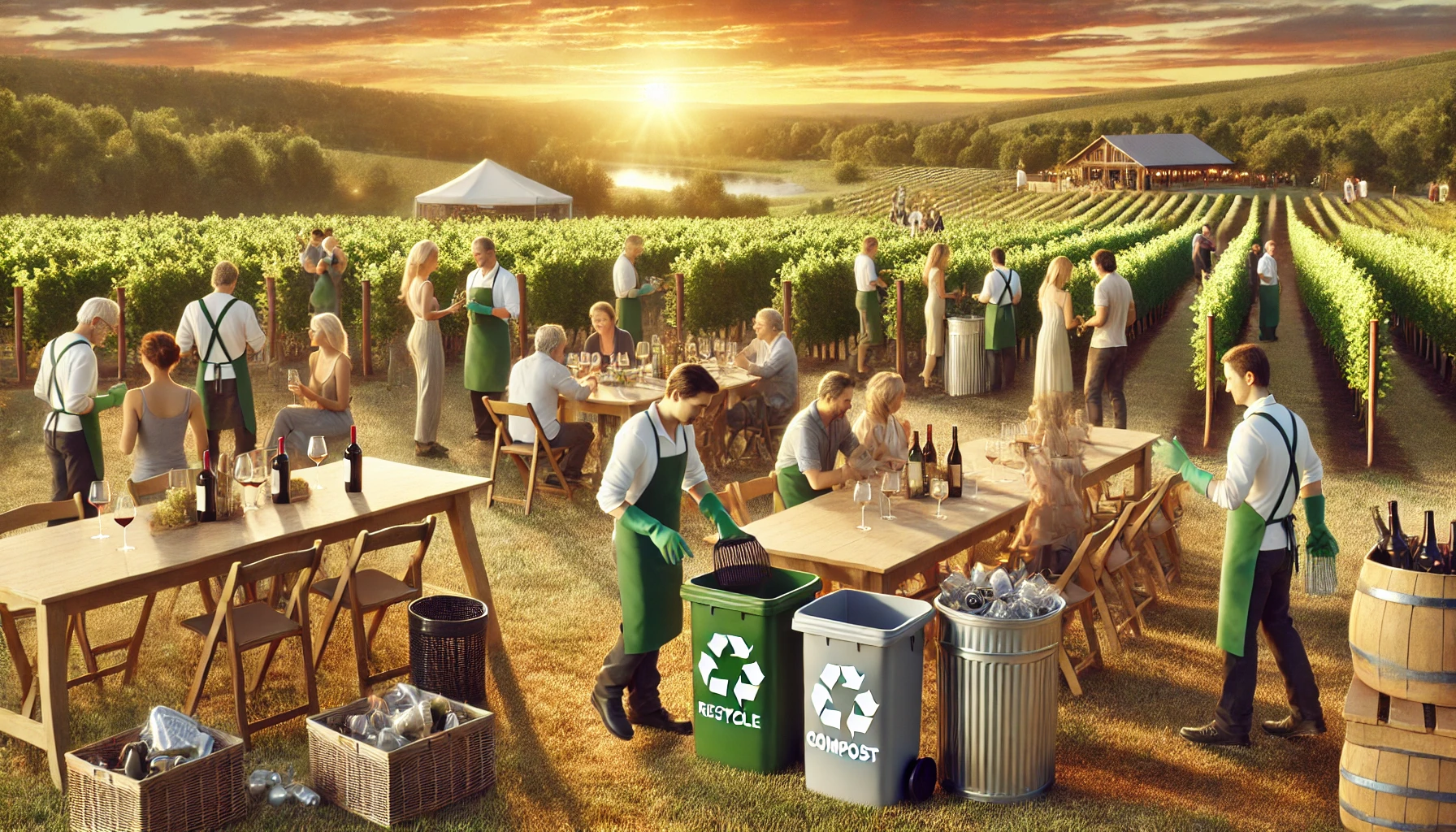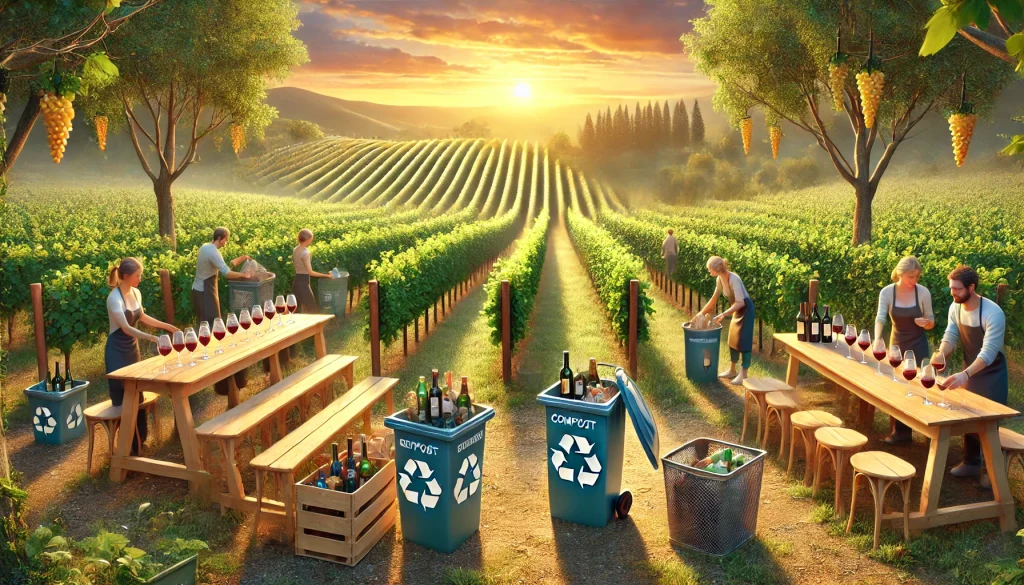
A wine festival is a magical experience filled with laughter, music, and, of course, the finest pours. But once the last glass is raised and the crowds disperse, what’s left behind can be far less glamorous. Plastic cups, food wrappers, broken bottles, and more—events like these generate significant waste. Tackling this mess responsibly isn’t just an environmental concern; it’s essential for maintaining the reputation of the wine community.
In this article, we’ll explore how wine festivals and wineries can tackle waste effectively, embrace sustainable practices, and ensure clean, green budget-friendly operations.
Why Waste Management Matters at Wine Events
A successful wine event doesn’t just depend on great wine and good vibes. A clean venue, free of litter, leaves a lasting impression on guests. Neglecting waste management can tarnish an event’s reputation and even deter future attendees.
Moreover, festivals often occur in picturesque locations—vineyards, historic estates, or open fields. These are fragile ecosystems. Poor waste disposal risks harming local wildlife and damaging the environment.
Common Sources of Waste at Wine Festivals
Understanding the types of waste generated is the first step to responsible management. At a typical wine festival, waste can include:
- Plastic Cups and Utensils: Single-use items still dominate many events.
- Glass Bottles: Broken wine bottles are not only unsightly but also a safety hazard.
- Food Waste: Leftovers from vendors and guests often pile up quickly.
- Promotional Materials: Flyers, banners, and packaging create additional trash.
Each type requires different disposal methods, and that’s where planning becomes crucial.
Strategies for Responsible Waste Disposal
1. Recycling Stations at Every Turn
Festivals should have clearly marked recycling stations for glass, plastic, and paper. Place them near food vendors and seating areas to encourage use.
2. Partnering with Rubbish Removal Services
Hiring a professional rubbish removal service can make cleanup far more efficient. Services specializing in large-scale waste management handle sorting, recycling, and disposal, leaving organizers free to focus on the event.
For organizers, it’s essential to find cost-effective rubbish removal solutions. Check out this article on considerations for rubbish removal in budget properties for tips on managing waste without overspending.
3. Encouraging Reusable Items
Provide guests with branded, reusable wine glasses or utensils as part of their ticket package. Not only does this cut down on waste, but it also serves as a memorable keepsake.

4. Composting Food Waste
Set up compost bins for food waste. Many local farms or organizations will gladly accept compostable material, turning what would otherwise be trash into a valuable resource.
Keeping Wineries Clean and Green
Festivals aren’t the only place where waste piles up. Wineries themselves face unique waste management challenges.
The Waste Wineries Produce
- Grape Skins and Stems: During winemaking, large amounts of organic material are left over.
- Broken Bottles: Even in careful operations, glass waste is inevitable.
- General Rubbish: Cardboard boxes, plastic wrap, and everyday waste can quickly accumulate.
For small wineries or hobbyist setups, these issues can feel overwhelming. But managing waste responsibly is critical for sustainability and efficiency.
Practical Waste Management Tips for Wineries
- Repurposing Organic Waste: Grape skins and stems can be composted or used as livestock feed. This reduces landfill waste and adds value to what might otherwise be discarded.
- Recycling Glass and Cardboard: Partner with local recycling centers to dispose of bottles and packaging responsibly.
- Hiring Affordable Rubbish Removal Services: Budget-friendly solutions are available, even for smaller operations. These services can handle large volumes of mixed waste, saving wineries time and effort.
How Sustainability Benefits the Wine Industry
Sustainability isn’t just good for the planet—it’s great for business. Wine lovers increasingly prefer brands that prioritize environmental responsibility. Clean vineyards and green events communicate care, professionalism, and forward-thinking values.
In fact, studies show that eco-conscious practices can even increase customer loyalty. When guests see an event or winery taking waste management seriously, they’re more likely to support it in the future.
Real-Life Examples of Waste Management Success
Hunter Valley Wine & Food Festival
Australia’s Hunter Valley festival implemented a robust waste management plan, featuring recycling stations, reusable glassware, and compost bins. Attendees appreciated the festival’s commitment to sustainability, and the event has become a model for green practices.
Napa Valley’s Sustainability Efforts
Many wineries in Napa Valley, such as Frog’s Leap Winery, have embraced zero-waste initiatives. They compost grape pomace, recycle materials, and use solar energy to reduce their environmental footprint. These efforts attract eco-conscious tourists and set an industry standard.
The Role of Budget-Friendly Solutions
Small-scale event organizers or budget-conscious wineries may worry about the costs of sustainable waste management. However, there are plenty of affordable options:
- Partner with local rubbish removal companies for tailored solutions.
- Share recycling or composting resources with nearby businesses.
- Apply for grants or sponsorships aimed at promoting sustainability in small businesses.

Conclusion: Clean Today, Green Tomorrow
Waste management might not be the most glamorous part of wine culture, but it’s one of the most essential. Whether you’re hosting a wine festival or running a boutique winery, tackling rubbish responsibly ensures the industry remains beautiful, sustainable, and respected.
By implementing small changes—like setting up recycling stations, repurposing organic waste, and partnering with budget-friendly rubbish removal services—you can make a big difference. Clean vineyards, green events, and happy attendees? That’s a win for everyone.